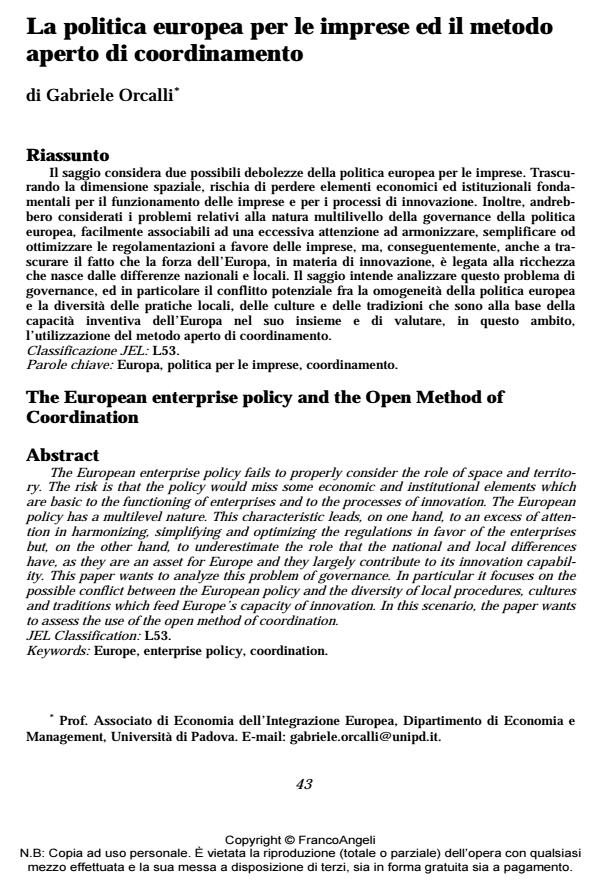The European enterprise policy and the Open Method of Coordination
Journal title ARGOMENTI
Author/s Gabriele Orcalli
Publishing Year 2014 Issue 2014/41
Language Italian Pages 23 P. 43-65 File size 118 KB
DOI 10.3280/ARG2014-041003
DOI is like a bar code for intellectual property: to have more infomation
click here
Below, you can see the article first page
If you want to buy this article in PDF format, you can do it, following the instructions to buy download credits

FrancoAngeli is member of Publishers International Linking Association, Inc (PILA), a not-for-profit association which run the CrossRef service enabling links to and from online scholarly content.
The European enterprise policy fails to properly consider the role of space and territory. The risk is that the policy would miss some economic and institutional elements which are basic to the functioning of enterprises and to the processes of innovation. The European policy has a multilevel nature. This characteristic leads, on one hand, to an excess of attention in harmonizing, simplifying and optimizing the regulations in favor of the enterprises but, on the other hand, to underestimate the role that the national and local differences have, as they are an asset for Europe and they largely contribute to its innovation capability. This paper wants to analyze this problem of governance. In particular it focuses on the possible conflict between the European policy and the diversity of local procedures, cultures and traditions which feed Europe’s capacity of innovation. In this scenario, the paper wants to assess the use of the open method of coordination.
Keywords: Europe, enterprise policy, coordination.
Jel codes: L53
- Amin A. (1999). An Institutionalist Perspective on Regional Economic Development. International Journal of Urban and Regional Research, 23, 2: 365-378.
- DOI: 10.1111/1468-2427.00201.ArrowsmithJ.,SissonK.,MarginsonP.(2004).WhatCanBenchmarkingOffertheOpenMethodofCoordination?JournalofEuropeanPublicPolicy11,2:311-328.DOI:10.1080/1350176042000194458
- Baldwin R., Martin P. (2006), Coordination of Industrial Policy in the European Union. EIB Papers, vol.11, n.1.
- Borras S., Jacobsson K. (2004). The Open Method of Co-ordination and New Governance Patterns in the EU. Journal of European Public Policy 11, 2: 185-208. DOI: 10.1080/1350176042000194395
- Commissione delle Comunità Europee (2000). Challenges for Enterprise Policy in the Knowledge-driven Economy. Proposal for a Council Decision on a Multiannual Programme for Enterprise and Entrepreneurship (2001-2005). Luxembourg: Office for Official Publications of the European Communities.
- Commissione delle Comunità Europee (2000). Towards Enterprise Europe: Work Programme for Enterprise Policy, 2000-2005. SEC(2000)771, Brussels.
- Commissione delle Comunità Europee (2005). Attuare il programma comunitario di Lisbona:una politica moderna a favore delle PMI per la crescita e l’occupazione. Bruxelles, 10.11.2005.
- Commissione delle Comunità Europee. (2012). Un’industria europea più forte per la crescita e la ripresa economica. COM (2012) 582 final.
- Consiglio Europeo (2001). Conclusioni della Presidenza, Consiglio Europeo di Lisbona, 23 e 24 Marzo 2000.
- Culpepper P.D. (2001). Employers, Public Policy, and the Politics of Decentralized Cooperation in Germany and France. In Hall P.A., Soskice D. (eds.). Varieties of Capitalism: the Institutional Foundations of Comparative Advantage. Oxford: Oxford University Press. 275-306.
- DiMaggio P., Powell,W. (1983). The Iron Cage Revisited: Institutional Isomorphism and Collective Rationality in Organizational Fields. American Sociological Review, 48, 2: 147-170.
- Ebner A. (2010). Varieties of Capitalism and the Limits of Entrepreneurship Policy: Institutional Reform in Germany’s Coordinated Market Economy. Journal of Industry Competition and Trade, 10, 3/4: 319 -341. Doi 10.1007/s10842-010-0086-x.
- Elmuti, D., Kathawala, Y. (1997). An Overview of Benchmarking Process: a Tool for Continuous Improvement and Competitive Advantage. Benchmarking: An International Journal, 4, 4: 229-243. DOI: 10.1108/14635779710195087
- GHK/Technopolis, (2006). Evaluation of the Open Method of Coordination activities coordinated by DG Enterprise and Industry. Final Report. Brussels.
- Hall P., Soskice D. (2001). Varieties of Capitalism: The Institutional Foundations of Comparative Advantage. Oxford: Oxford University Press.
- Hodson D., Maher I. (2001). The Open Method as a New Mode of Governance: The Case of Soft Economic Policy Co-ordination. Journal of Common Market Studies, 39: 4, 716-746. DOI: 10.1111/1468-5965.00328
- Kaiser R., Prange H. (2004). Managing Diversity in a System of Multilevel Governance: the Open Method of Coordination in Innovation Policy. Journal of European Public Policy, 11, 2: 249-266. DOI: 10.1080/1350176042000194421.LeibovitzJ.(2003).Interrogating“EnterpriseEurope”:IssuesofCoordination,GovernanceandSpatialDevelopmentintheEuropeanUnion’sEmergingEnterprisePolicy.InternationalJournalofUrbanandRegionalResearch,27:3,713-722.Doi:10.1111/1468-2427.00477
- North D. (1990). Institutions, Institutional Change and Economic Performance. Cambridge University Press. Oxford.
- Ostrom E. (1990). Governing the Commons: The Evolution of Institutions for Collective Action. New York. Cambridge University Press.
- Parlamento Europeo (2007). Decisione n. 1639/2006/CE che istituisce un programma quadro per la competitività e l’innovazione. Bruxelles.
- Power M. (1997). The Audit Society: Rituals of Verification? Oxford: Oxford University Press.
- Smismans S. (2004). EU employment policy: decentralisation or centralization through the open method of coordination? EUI Working Paper Law, n. 2004/1.
- Wood S. (2001). Business, government and patterns of labor market policy in Britain and the Federal Republic of Germany. In Hall P., Soskice D.. Varieties of Capitalism: The Institutional Foundations of Comparative Advantage. Oxford. Oxford University Press. 247-273.
Gabriele Orcalli, La politica europea per le imprese ed il metodo aperto di coordinamento in "ARGOMENTI" 41/2014, pp 43-65, DOI: 10.3280/ARG2014-041003